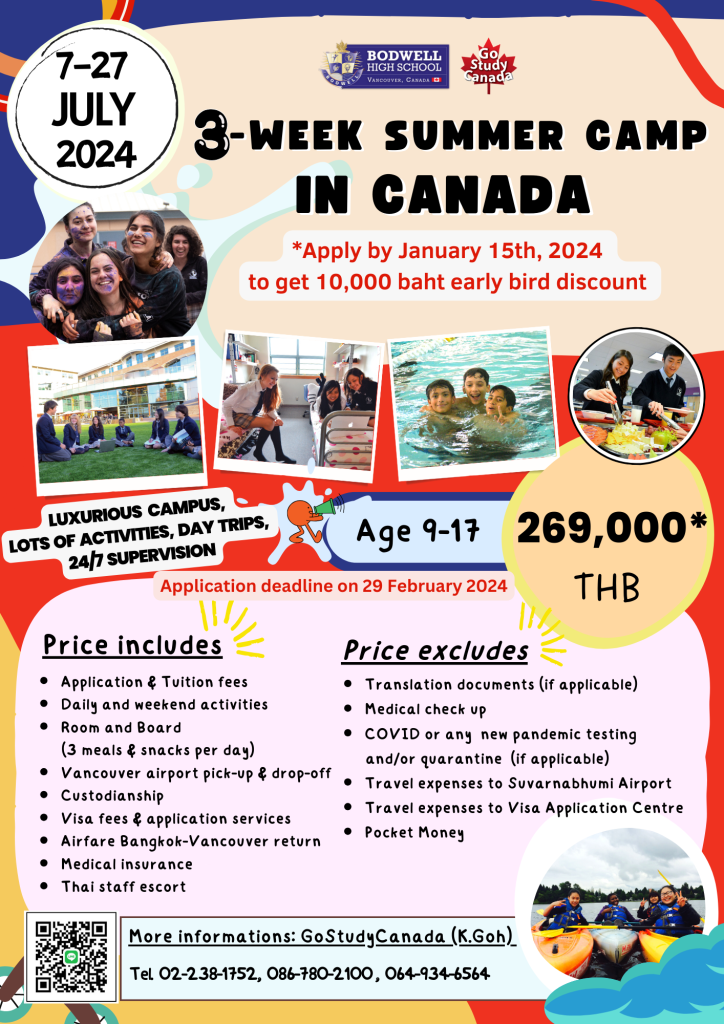
Why Send Your Child On An International Summer Program?
International travel and overseas education have become increasingly popular in the past 15-20 years, and it seems that this trend will continue. However, only a small percentage of students get to experience an overseas summer program, and this is likely due to the high cost of such programs, which limits access to students from higher-income families. It may also be due to a lack of information about the benefits of these programs.
During a recent reunion, I overheard a conversation among friends and colleagues who were comparing their children’s experiences in an overseas summer program. One family had a seemingly perfect trip and was highly recommending it to others, while the other family was not as pleased with the trip and did not feel that it was worth the money spent. Interestingly, both children had traveled together on the same tour but had vastly different experiences. So what could have caused such a difference in their perceptions?
First, let’s look at the reasons, perceived or real, for parents to send their child on an overseas program.
In my 20 years as an education consultant and student recruiter for Canadian high schools and institutions, the 3 most common reasons stated by parents of students are as follows:
- Global Perspective: gain exposure to different cultures, languages, and ways of thinking. It broadens your horizons and helps you see the world (and your own country and culture) from a new perspective.
- Personal Development: Living overseas fosters independence and adaptability. It’s a great way to gain life skills and making lifelong friends from around world.
- Quality Education: Many international programs offer high-quality education and cutting-edge research opportunities. This can lead to better career prospects and personal growth.
Whatever the reason, and there are more, the reason for doing something and getting value out of it will come down to you.
As we all sat around, munching on hors d’oeuvres and sipping on drinks, two mothers began describing tours their children had been on. At first, we didn’t pay much attention. However, things got interesting when we realized they were describing the same tour program. One mother praised it highly, while the other gave it a mediocre rating of 5 out of 10. We were left wondering whether they both had been on the same tour offered by the same institution. The conversation quickly turned into a heated debate, and everyone sat up, paying closer attention to the discussion.
As someone who pays close attention, especially given my profession, it was clear that the two mothers had different perspectives. Their expectations, attitudes, and mindsets were quite apparent, and it was evident which child would benefit the most from an overseas program. At times, the conversation became quite lively. It was challenging to keep track of the arguments and counter-arguments, the positives, and the negatives, but two common themes emerged.
Managed vs Unmanaged Expectations
The mother who was happy with the tour (let’s call her Happy) and who believed her daughter got value out of the program had realistic expectations. She understood that regardless of the best planning in the world, sometimes things just don’t work out and one needs to adapt. Happy had prepared her daughter for such eventualities and had taught her daughter to make the best of it. This particular tour was hit with extremely bad, unseasonable weather, which prevented the children from experiencing certain activities. Because of the duration and timing of the bad weather, there was not enough time to reschedule the missing activities, which had to be replaced with some other indoor activity. In this particular case, the daughter got to experience indoor rock climbing, which was not part of the program, but which had been provided given the hike up the mountain was canceled. Oddly enough, the daughter thought rock climbing was more fun and exciting then actually going up the mountain. She adapted and came out ahead.

The second mother (will call her Unhappy) kept harping on the fact that the program organizers should have anticipated the bad weather, and planned for the activity to happen earlier in the program so that it could be rescheduled if the need arose. Understandably, her son was very disappointed that the hike was cancelled but could not let go of this fact and therefore did not get as much enjoyment out of the indoor rock climbing.
Happy had much clearer expectations of an overseas program and was focused on all the benefits that both a positive and negative experience could bring her daughter.
Attitude and Mindset
As the discussion continued, it became obvious that Happy and a positive mindset and attitude. Although she found some parts of the program could be improved or changed to be more to her liking, she focussed on the positive aspects of the tour. When her daughter complained about the food, being tired or not liking a certain activity, she tried to get her daughter to see things in a positive light, or understand what was happening at that moment that made her unhappy. Not happy with food? That’s OK. You don’t have to like it, but you should try it at least once. Try it multiple times and you might even develop a taste for it. It’s not bad food, it’s just different and not to her liking. She asked her daughter how she could deal with this issue in the future.
Unhappy, on the other hand, sympathized with her son’s plight and instructed him to complain to the teacher or tour escort. Instead of explaining to her son why the food was not to his liking, she simply agreed with him that the food was ‘bad’, and reinforced the fact that he was ‘victimized’. The fact that the other students liked the food had no bearing on her reaction. Unhappy lost the opportunity to teach her son a life lesson, which is one of the main reasons in my mind for traveling overseas.
I could go on at length about the pros and cons that were brought up on this particular trip and how the different approaches used by Happy and Unhappy resulted in two very different trips for their children, but I think you can already see where this is going. Any overseas summer program will have some pros and cons and how you prepare your child before they depart, and how you support or coach them while they are overseas, will greatly determine their level of satisfaction with the program and how much, or little, they get out of it AND your level of anxiety while they are away.

Here are my top 3 suggestions to ensure your child enjoys the trip and gets as much benefit as possible.
- Know Who You’re Dealing With: Check out the institution or agency you are signing up with. Check for references from governmental agencies and parents who have taken one of the agency’s tours in the past. Have they had successful programs in the past? Do they have lots of good references? Have they been in business for long and did they survive COVID (a good indication of a company’s financial ability to right a wrong if need be)? Did they receive negative comments on the local education forums?
- Manage Your Child’s Expectations: Ask yourself what you are looking to get out of the program. Talk with your son and daughter about what kind of program would make them happy. Prepare them to handle any disappointment that might come up. And remember, every event, even one that is initially perceived as negative, can have some benefits. Life teaches us many lessons in the most unexpected situations if we are open to receiving them. Don’t lose that opportunity.
- Coach Don’t Do: This is your child’s program, not yours. Be there to support them as they go through the program and encounter obstacles, disappointments, or other issues. Encourage them to participate to the fullest and don’t solve problems for them when problems arise. Rather, discuss the problem with them and help them find and work their way through to a solution. This is how they learn and grow.
Whatever your reason to send your child on an overseas summer program, I highly recommend that they experience this once before they start university. The benefits will outweigh the costs.



